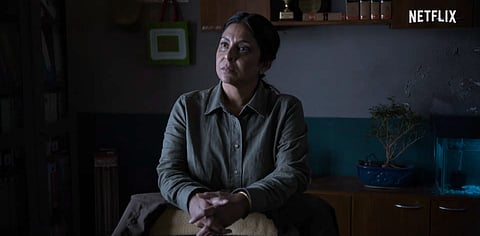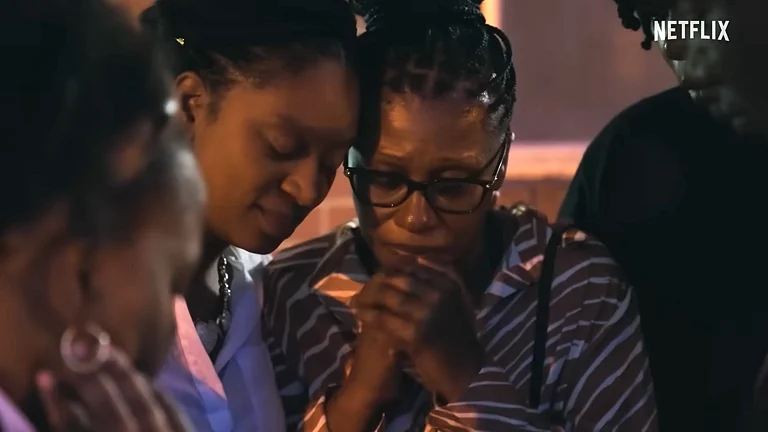Delhi Crime Season 3 has released on Netflix on November 13, 2025.
The show has Huma Qureshi and Sayani Gupta this season, in addition to Shefali Shah, Rajesh Tailang and Rasika Dugal in lead roles.
The latest season is based on human trafficking.
Delhi Crime Season 3 Review | A Fine Cast Caught In An Overcrowded Script
Instead of being shown through the narrative, most major plot points this season are told in a monologue, breaking the cardinal rule of screenwriting: show, don’t tell.
The third season of Netflix's Delhi Crime opens with a mass wedding in Rohtak, Haryana. There are rows of young brides in crimson veils and visibly older men in cream pagdis and suits. The sequence cuts away before we dive in too deep. Soon, we’re in Silchar, Assam, where Vartika Chaturvedi (Shefali Shah), now a DIG (Deputy Inspector General of Police), narrates her own displacement.
The voiceover tells us that Chaturvedi’s new posting, though called a “transfer,” is really punishment. For what, we’re not told. As she chases a lead on weapons smuggling across the border, she intercepts a truck full of trafficked girls. From that moment, the series expands beyond its Delhi roots—to Aizawl in Mizoram, to the docks of Mumbai, even to Thailand—tracing a trafficking network that swallows up India’s most invisible: young women and children.

Parallel to Vartika’s discovery in Silchar runs a case in Delhi, where a two-year-old girl named Baby Noor (echoing the real-life Baby Falak case of 2012) is admitted to AIIMS with bloody bite marks and brutal brain injuries. This storyline, depicting Aditi Subedi’s 14-year-old trafficking victim Khushi, is one of the most fully realised this season. It throws in a nuanced understanding of how gendered trauma replicates itself through cycles of abuse. And it does so better than the main storyline, which tries to convey the same idea through Huma Qureshi’s “Badi Didi”, the ringleader of the trafficking operation, who is both victim and perpetrator of patriarchal abuse.
Once the connection between the two cases becomes apparent Vartika is reunited with her old team—Rasika Dugal (as Neeti Singh), Rajesh Tailang (as Bhupendra Singh), Jaya Bhattacharya (as Vimla Baradwaj), Anuraag Arora (as Jairaj Singh), Gopal Datt (as Sudhir Kumar), and Sidharth Bhardwaj (as Shubhash Gupta).

After the first season’s retelling of the 2012 Delhi gang rape case and the second’s portrayal of the “Kachcha Baniyan” killings, Delhi Crime season three takes on the murky world of human trafficking. Directed by Tanuj Chopra, and co-written by six writers—Chopra, Anu Singh Choudhary, Apoorva Bakshi, Michael Hogan, Mayank Tiwari, and Shubhra Swarup—the show attempts to thread together multiple crimes under one umbrella of systemic rot, but ends up spreading itself too thin.
The first season, created by Richie Mehta, had its procedural rhythms tight, its morality clear. Despite arguments of polishing the image of Delhi Police during the height of the student protests, Mehta’s season remained compelling television. The second season maintained that intimacy, despite losing a little steam. However, in season three, something essential has been lost. The budget is visibly bigger but, despite the wider bandwidth, the storytelling feels diluted.

Vartika remains the moral centre of the show. Shah continues to deliver a performance that balances stoicism and empathy. But her arc this season feels repetitive. She’s still the lone crusader who cuts through red tape with grit and instinct, still the officer who prefers the field over bureaucratic posturing. The script gestures at her punishment posting, her professional isolation, her fight against a patriarchal system—but these resolve too easily. She gets her team back, resources pour in, and the system, once again, bends to her will.
Everyone, from Dugal and Tailang to Bhattacharya, slip back into their roles with ease. The show gives each of them a small subplot—a clue to chase, a witness to interrogate, a moral dilemma to resolve. Mita Vasisht, Yukti Thareja, and Anshumaan Pushkar (who performs with his entire physicality) leave an impression. This mosaic-like structure allows the narrative to stay propulsive, but it also means that none of the newer characters get enough space to breathe.

The biggest missed opportunity is Qureshi’s Badi Didi. On paper, she is a formidable antagonist: the widow of a respected community elder in Haryana, turned trafficker, commanding a network that stretches across borders. Her transformation—from a woman nearly killed as a child by her own grandmother, married off at fifteen, brutalised by her husband and father-in-law, to a matriarchal monster who sells other women—is rich material. But instead of being shown through the narrative, it’s told in a monologue, breaking the cardinal rule of screenwriting: show, don’t tell. Of course, there are exceptions to this rule that have been effective in cinema, but this is not one of its shining examples.

The one truly magnetic moment from her comes late in the final episode: Badi Didi delivering a speech to a group of trafficked girls, only to be interrupted by a child’s cough. Her fury in that instant is feral. But then it fizzles out.
Badi Didi could have been a wonderful grey character study in motion. Instead, she is a run-of-the-mill Haryanvi-accented villain, who switches from cotton sarees and salwars in the rural pockets of the country to chic business casuals when meeting clients in bigger cities.

Sayani Gupta is underutilised. The trafficked girls are not individualised either—their stories summarised in police reports or dialogue. We’re told they come from poor families, or were sold, or ran away seeking work. But we never get to dwell too much on them. Reema Kagti and Zoya Akhtar’s Dahaad (2023) actually did a much better job underlining the reality of such disenfranchised young women, even though a different fate awaited them in the series starring Sonakshi Sinha.
That’s not to say Delhi Crime season three doesn’t deliver moments of tension. The show still excels at atmosphere. Its production design captures the grimy, bureaucratic texture of law enforcement. But while earlier seasons probed moral questions with more intention, this time it feels less engaged. The resolution is too clean, the stakes too easily neutralised. Delhi Crime season three is still efficient, but it's just not as fun anymore.
Debiparna Chakraborty is a film, TV, and culture critic dissecting media at the intersection of gender, politics, and power.
